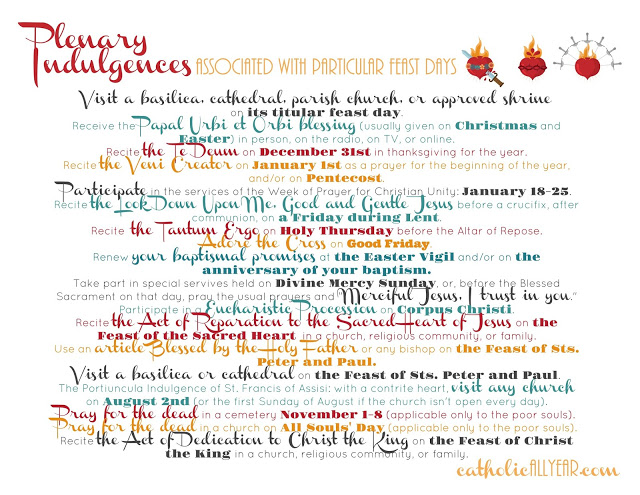Indulgences! So much opportunity, so much confusion and misinformation. And that’s just among Catholics. It’s really difficult to even find any information at all online about the most recent version of the Manual of Indulgences, a 1999 revision that replaced the 1968 version. So I’m about to lay it all on you: What indulgences are and what they are not, and a complete list of how and when and where to obtain all currently available indulgences. (If you find any errors, please let me know. I’ll be happy to fix them.)
Edited to add: here it is in its entirety for free online!
Part of the collateral damage of the long ago Protestant revolt and, more recently, all of the upheaval following the liturgical reforms after Vatican II is that many Catholics have largely forgotten about indulgences. Which is a huge bummer for us, because indulgences are a beautiful, charitable, and efficacious practice for kids and grownups alike. If you don’t know what indulgences are at all, or if you’ve only heard negative things about them, you might want to take a look at the always excellent and thorough explanations given by Catholic Answers.
Primer on Indulgences and Myths about Indulgences
Indulgences are part of the Church’s infallible teaching. This means that no Catholic is at liberty to disbelieve in them. The Council of Trent stated that it “condemns with anathema those who say that indulgences are useless or that the Church does not have the power to grant them”(Trent, session 25, Decree on Indulgences). Trent’s anathema places indulgences in the realm of infallibly defined teaching. (Catholic Answers)
Indulgences aren’t a money grab by villainous medieval bishops, and they aren’t a get out of hell free card. What they are is the way the Church can exempt a member of the faithful from the temporal punishment due to their sins, after that person has already been forgiven of the eternal consequences of sin through confession, and the sacrifice of Jesus Christ.
Say Johnny’s playing baseball in the living room and breaks a vase. He might muster his courage and confess, and he might have true sorrow and contrition, and you might forgive him. You’re not going to kick him out of the house (eternal consequence). But that doesn’t unbreak the vase. The broken vase is the temporal consequence of vase-breaking. It must be replaced. The Bible teaches us that there are always both eternal and temporal consequences of sin.
So you might set up a payment plan for Johnny, and allow him to do extra chores and earn money to put away towards buying a replacement vase, as the temporal consequence. But then, maybe all the other kids in the neighborhood pool their savings and go in together to buy a new vase. Indulgences are like that. Our prayers and sacrifices and good works all go in together with the prayers and sacrifices and good works of Christ and the saints who have gone before us and can be applied by the Church where the Church chooses. Binding and loosing and all that.
But, just as importantly, indulgences should be seen as the way that the Catholic Church instructs the faithful on which prayers, practices, and devotions will be most beneficial to our souls.
An indulgence is obtained through the Church who, by virtue of the power of binding and loosing granted her by Christ Jesus, intervenes in favor of individual Christians and opens for them the treasury of the merits of Christ and the saints to obtain from the Father of mercies the remission of the temporal punishments due for their sins. Thus the Church does not want simply to come to the aid of these Christians, but also to spur them to works of devotion, penance, and charity. (CCC 1478)
The Bible and Canon Law and the Catechism of the Catholic Church are the rule books/guide books. They cover in great detail all the dos and don’ts and the whys and why nots of our faith. The Manual of Indulgences is more like a playbook. It’s specific things to do on specific days or in specific circumstances. While the prayers and practices recommended ALSO have indulgences attached to them that can be applied to ourselves or to the holy souls in purgatory, the fact of their being included in the manual shows that these are the prayers and practices that the Catholic Church believes will be the most beneficial to us.
Every one is a twofer.
We are gaining a reward: Hey, free vase! But at the same time we are growing in wisdom and prudence and, I don’t know, reflexes, so we’re less likely to break any more vases. And then our future savings can be applied to other kids in the neighborhood who break vases. I feel like this metaphor might be getting away from me.
Back to basics . . . The following are the indulgences available to Catholics as of the 1999 Manual of Indulgences. The suggested prayers are required to be an approved version/translation. For an expanded list of indulgences, and more details about conditions and specific actions required, and the full text of prayers, consult the book or ebook or the google books version.
The Usual Conditions for Indulgences
- Indulgences can be plenary (full) or partial, and so remove either all or part of the temporal punishment due to sins.
- Indulgences can be gained for yourself, or applied to the holy souls in purgatory, but not to another living person.
- To gain an indulgence, you must be a baptized Catholic, not excommunicated, and not in a state of mortal sin at the time of the actions taken for the indulgence.
- You must have the intention of gaining the indulgence, and perform the required actions in the required amount of time and in a devout manner.
- You can gain many partial indulgences, but only one plenary indulgence per day, except that you can gain a second plenary indulgence at the point of death.
- If the indulgence requires visiting a church or oratory, you should devoutly recite the Our Father and the Creed during the visit.
- To gain a plenary indulgence you must be free from all attachment from sin, even venial sin.
- You must perform the required actions, receive Holy Communion, make a sacramental confession, and pray for the intentions of the Holy Father.
- It is preferred that you receive communion and pray for the intentions of the Holy Father on the same day that you perform the actions, but within within several days (about 20) before or after is acceptable. These must be performed for each indulgence sought.
- Confession should be made within within several days (about 20) before or after the actions for the indulgence. One confession can apply to many indulgences.
- The usual prayers offered for the intentions of the Holy Father are one Our Father and one Hail Mary.
- If all the conditions are not met, the indulgence becomes partial, rather than plenary.
- Things that we are obliged to do, like Mass attendance, are understood to confer graces and are not enhanced with indulgences.
Plenary Indulgences
- Spend thirty minutes or more in adoration of the Blessed Sacrament.
- Participate in the Stations of the Cross, using fourteen stations, marked by at least crosses, progressing from one to the next.
- Recite the five decades of the Rosary in a church, religious community, or family, or while listening live to the Holy Father’s Rosary.
- Read or listen to Sacred Scripture for at least thirty minutes, preference is given to reading.
- Make a three day retreat.
- At the point of death, pray, ideally before a crucifix or cross (requires that you have been in the habit of praying during your life).
- Participate in a parish mission and its conclusion.
- Attend a ceremony in honor of a new saint during the first year after canonization (available once).
- For priests, and those in attendance, a priest’s first Mass, and the jubilee celebrations for priests and bishops renewing their vocational promises.
- Visit the church during a diocesan synod.
- Assist during a pastoral visit.
- Make a pilgrimage to one of the four Patriarchal Basilicas in Rome.
Plenary Indulgences Associated with Particular Feast Days
- Visit a basilica, cathedral, parish church, or approved shrine on its titular feast day.
- Receive the Papal Urbi et Orbi blessing (usually given on Christmas and Easter) in person, on the radio, on TV, or online.
- Recite the Te Deum on December 31st in thanksgiving for the year.
- Recite the Veni Creator on January 1st as a prayer for the beginning of the year, and/or on Pentecost.
- Participate in special celebrations for days universally designated for particular intentions (like Day of Prayer for Peace on January 1st, or Day of Prayer for Vocations on Good Shepherd Sunday, the 4th Sunday of Easter).
- Participate in the services of the Week of Prayer for Christian Unity: January 18-25.
- Recite the Look Down Upon Me, Good and Gentle Jesus before a crucifix, after communion, on a Friday during Lent.
- Recite the Tantum Ergo on Holy Thursday before the Altar of Repose.
- Adore the cross on Good Friday.
- Renew your baptismal promises at the Easter Vigil and/or on the anniversary of your baptism.
- Take part in special services held on Divine Mercy Sunday, or, before the Blessed Sacrament on that day, pray the usual prayers and “Merciful Jesus, I trust in you.”
- Participate in a Eucharistic Procession on Corpus Christi.
- Recite the Act of Reparation to the Sacred Heart of Jesus on the Feast of the Sacred Heart in a church, religious community, or family.
- Use an article Blessed by the Holy Father or any bishop on the Feast of Sts. Peter and Paul.
- Visit a basilica or cathedral on the Feast of Sts. Peter and Paul.
- The Portiuncula Indulgence of St. Francis of Assisi: with a contrite heart, visit any church on August 2nd (or the first Sunday of August if the church isn’t open every day).
- Pray for the dead in a cemetery November 1-8 (applicable only to the souls in purgatory).
- Pray for the dead in a church on All Souls’ Day (applicable only to the souls in purgatory).
- Recite the Act of Dedication to Christ the King on the Feast of Christ the King in a church, religious community, or family.
 |
| Free Printable! Click on the photo to open it in a new window, then right click to save it to your computer. If you’ve got the Catholic All Year Liturgical Wall Calendar (or any other calendar, of course!) just print this out and tape it to the back cover, so you’ll know about upcoming indulgence opportunities. |
Partial Indulgences
- Use a properly blessed crucifix, cross, rosary, scapular, or medal.
- Use pious invocations throughout the day, mentally or out loud (i.e. “Jesus, Mary, and Joseph,” “Heart of Jesus, I trust in you,” “Holy Mary, Mother of God, pray for us.”)
- Pray to the merciful heart of Jesus.
- Perform charitable works or charitable giving.
- Make a voluntary Christian witness to others.
- Teach or study Christian doctrine.
- Visit the Blessed Sacrament for any amount of time.
- Recite a Rosary alone, or recite a partial Rosary.
- Make an Examination of Conscience.
- Attend a monthly recollection.
- Spend time in mental prayer.
- Listen to preaching of the Word of God.
- Visit a cemetery and pray for the dead any time of year.
- Visit the catacombs.
- Make the sign of the cross using the customary words.
- Renew your baptismal vows at any time.
Partially Indulged Prayers
- Adoro te Devote
- O Sacred Banquet
- Tantum Ergo
- Act of Spiritual Communion
- Prayer for Christian Unity
- Magnificat
- Look Down Upon Me Good and Gentle Jesus
- Anima Christi
- Act of Contrition
- Angelus
- Regina Caeli
- Mary, Mother of Grace
- Hail Holy Queen (Salve Regina)
- Memorare
- Holy Mary, Help Those in Need
- Beneath Thy Protection
- The Guardian Angel Prayer
- To You O Blessed Joseph
- Holy Apostles Peter and Paul
- The collect prayer from the missal on a saints’ feast day
- Christmas Novena
- Pentecost Novena
- Immaculate Conception Novena
- Litany of the Holy Name
- Litany of the Most Sacred Heart
- Litany of the Most Precious Blood
- Litany of the Blessed Virgin Mary
- Litany of St. Joseph
- Litany of All Saints
- Little Office
- Prayer for Benefactors
- Prayer for the Holy Father
- Prayer at the beginning and end of work
- Prayer before and after meals
- Apostles’ Creed
- Nicene Creed
- Act of Faith
- Act of Hope
- Act of Love
- Eternal Rest Prayer
- Attempting to obtain indulgences is like following a Vatican-approved training program for strengthening your faith, while at the same time getting the amazing free bonus of time out of purgatory.
- Obtaining indulgences for the poor souls in purgatory is probably the single most charitable thing you could possibly do in your lifetime.
- If your goal is quantity: daily Mass, monthly confession, and a daily family Rosary including prayers for the Holy Father will get you a plenary indulgence (or at least a partial one, depending on the attachment to sin angle) every day of the year, in about an hour a day.
- If you are looking for a Whole Catholic Living approach: incorporating any or many of the yearly indulgences into your family’s annual traditions is a beautiful way to share in the deep history and universality of our Catholic faith.
If you’d like to keep track of ALL the feasts of the Catholic liturgical year, I’ve created a wall calendar to help you do it!
It features the all the feasts and fasts of the Universal Calendar and then some, illustrated with images featuring the traditional Catholic monthly devotions. It’s an easy visual way to bring liturgical living into your home. You can keep track of the feasts and fasts and seasons of the Catholic year, and be reminded to focus your prayer on a different aspect of our faith each month.
As the Church year begins with December, so does this calendar. You get December 2024 through December 2025, thirteen months. Available for purchase here. Thanks!







